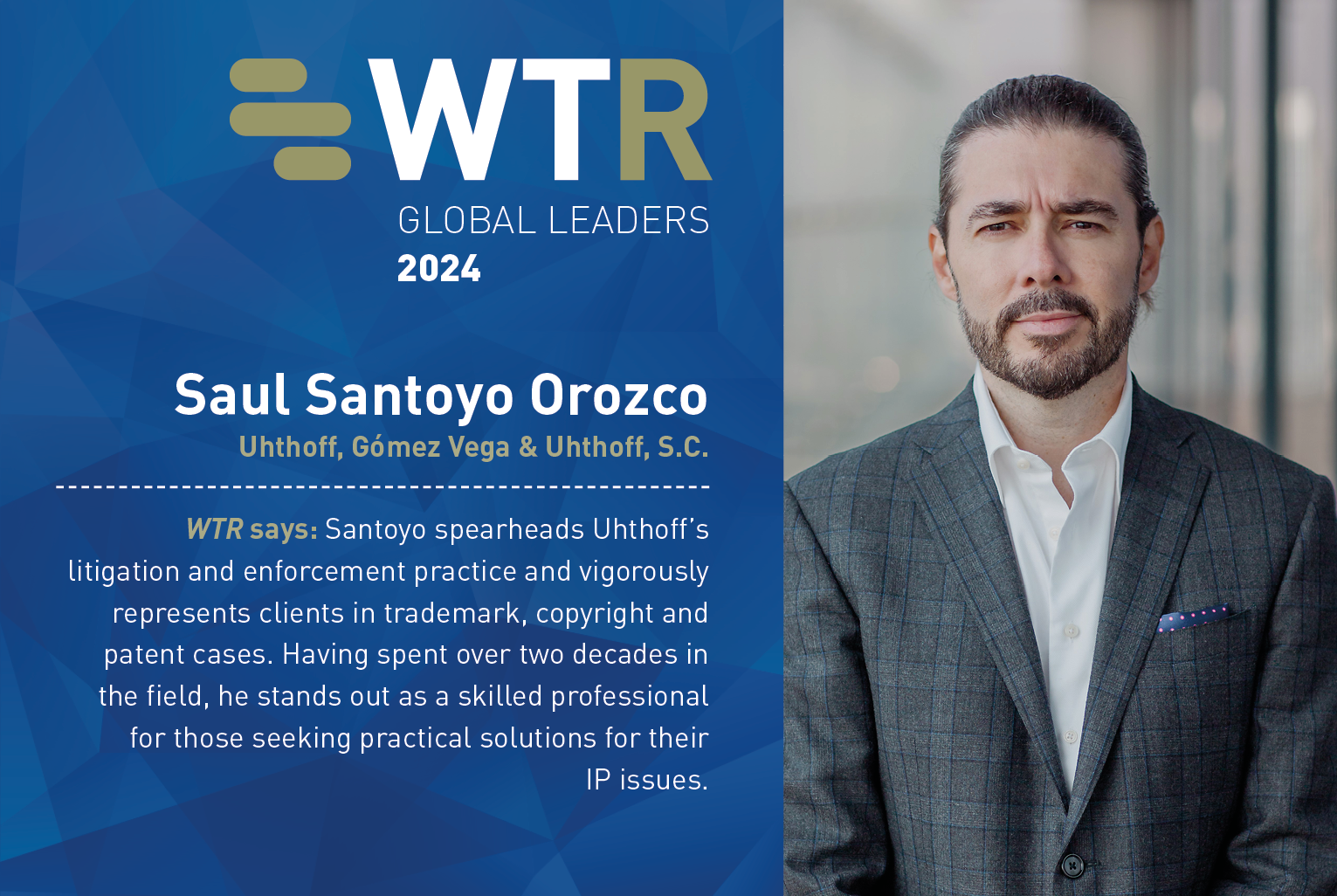Saul Santoyo Orozco

What has been your greatest professional achievement to date?
I have been litigating IP cases my whole professional life, often obtaining outstanding results which has been very rewarding. However, becoming senior partner at Uhthoff Gomez Vega & Uhthoff was a significant personal accomplishment. Among many gratifying features, this position has allowed me to mentor the next generation of legal professionals.
As an anti-counterfeiting specialist, what are the biggest challenges that you are seeing threaten brands, both online and offline?
Advances in technology, specifically AI-generated applications in manufacturing and design, could facilitate counterfeiters and bootleggers in copying genuine items at an even lower cost. The flexibility of distribution chains and the ever-increasing traffic of e-commerce has also led to more challenges in effectively detecting and taking action against infringers, especially with the dwindling resources assigned by the Mexican federal government to the various agencies (eg, the National Customs Agency and the General Prosecutor's Office). As these agencies are tasked with combatting the proliferation of counterfeiting, a lack of funds diminishes their capabilities to fulfill their mission. These are some of the main threats and concerns for IP owners.
How is your firm attracting and retaining key talent?
We have a permanent policy of reaching out to universities and law schools in order to attract new practitioners who are interested in developing a career in IP law and related fields. Further, all of our attorneys and technical practitioners are encouraged to continue their legal and/or technical education, with the firm facilitating, and in many cases, financing their graduate studies and specialisation. This complements our other policy of always revising our compensation packages and the perks granted to members of the firm in order stay competent in this aspect.
How have client demands evolved over the past 12 months?
As most companies are trying to be more efficient in their employment of resources and reduction of costs, they have become more demanding over what added value we can provide to them as their IP counsel. This is not only regarding how we advise them on where or how to spend their resources to maximise the protection and enforcement of their IP rights, but clients are also increasingly expecting a direct return or compensation from the expenditures made in the enforcement areas. This imposes a greater challenge for us as legal counsel when recommending when to exert legal action.
What steps are your firm taking to ensure that costs for clients are kept to a minimum?
We try to streamline our internal processes as much as possible and always aim to best accommodate the client's needs, which in turn reflects directly lowering costs transferred for the clients.
As head of litigation at your firm, what is the key to effective teamwork, especially in high-stakes cases?
I would say that it is the ability to clearly and effectively communicate the gameplan or strategy required for the case so that everyone is on the same page. Further, better supervising to stay ahead of any possible obstacle or delays during the process allows us to anticipate and avoid setbacks.
How do you see the appetite for domain-name applications changing over the coming months?
We have not yet seen an increase in the number of applications for domain names. As I understand it, markets are moving more towards social media platforms and non-conventional internet sites. However, once the cycle of platforms (eg, Twitch and TikTok) matures, it is likely we could see an increase in domain-name requests.
To what extent have you seen IP offices cancelling foreign marks as a result of geopolitical conflict, and should this be a concern or consideration for clients?
So far, at least in Mexico, we have not seen anything like this happening. While it would be hard to determine if this tendency should be of concern to clients, we are of the opinion that it would be unlikely to happen in Mexico, considering the neutral stance that our country has taken throughout history – even in very difficult and convulse times.
If you could change anything about the enforcement process in Mexico, what would it be, and do you think it is likely to happen?
We would grant full legal powers to customs officials (as is the norm in other jurisdictions), as this has been a long-time demand of the IP community in Mexico. In addition, we would reverse the trend of budget cuts and the scarcity of fully-trained personnel in the various agencies (including the General Prosecutor's Office) tasked with enforcing IP rights.
Technology is advancing at a rapid pace. How do you stay up to date with the latest developments, specifically those affecting brand protection?
As previously mentioned, Uhthoff Gomez Vega & Uhthoff encourages and facilitates all of our attorneys and technical practitioners to participate in both graduate academic activities and/or professional specialised IP associations. Further, our firm actively participates in different initiatives and chapters of professional associations (eg, INTA, ECTA, MARQUES, AIPLA, the Interamerican Association of Intellectual Property, the International Anti-counterfeiting Association and the American Chamber), where members have a strong focus on discussing and addressing issues pertaining to the enforcement of IP rights and brand protection.
Saúl Santoyo Orozco
Senior Partner
[email protected]
As senior partner and head of the litigation department at Uhthoff Gómez Vega & Uhthoff, Saúl Santoyo Orozco focuses on IP litigation, enforcement and anti-counterfeiting issues. With extensive experience handling complex IP litigation, he has particular expertise in patent litigation and co-chairs the firm’s entertainment committee. Mr Orozco holds a law degree from the Universidad La Salle Faculty of Law in Mexico City and has completed postgraduate studies in intellectual property and international commerce.